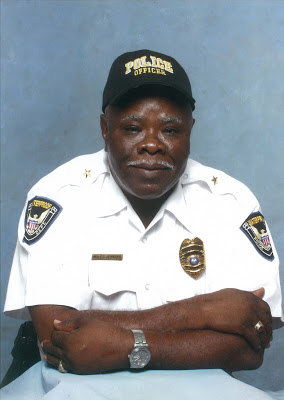Did racist coup in northern Louisiana town
Overthrow Black mayor and police chief?
By Jordan Flaherty / The Rag Blog / March 27, 2010
NEW ORLEANS — In Waterproof, a small northern Louisiana town near Natchez, Mississippi, the African-American mayor and police chief assert that they have been forced from office and arrested as part of an illegal coup carried out by an alliance of white politicians and their followers.
In a lawsuit filed last week, Police Chief Miles Jenkins asserts a wide-ranging conspiracy involving the area’s district attorney and parish sheriff, along with several other members of the region’s entrenched political power structure. These events come at a time when the validity of federal power is being questioned because of the race of the U.S. president, and in a state where white political corruption and violence have been and continue to be used as tools to fight Black political power.
About 800 people live in Waterproof, a rural community in the south of Tensas Parish. Tensas has just over 6,000 residents, making it both the smallest parish in the state, and the parish with the state’s fastest declining population. The parish’s schools remain mostly segregated, with nearly all the Black students attending public schools, and nearly all the white students attending private schools.
With a median household income of $10,250, Waterproof is also one of the poorest communities in the U.S. The only jobs for Black people in town are in work for white farmers, according to Chief Jenkins. “Unless you go out of town to work,” he says, “You’re going to ride the white man’s tractor. That’s it.”
Bobby Higginbotham was elected mayor of Waterproof in September of 2006. The next year, he appointed Miles Jenkins as chief of police. Jenkins, who served in the U.S. military for 30 years and earned a master’s degree in public administration from Troy University in Alabama, immediately began the work of professionalizing a small town police department that had previously been mostly inactive.
“You called the Waterproof police for help before,” says Chief Jenkins, “He would say, wait ‘til tomorrow, it’s too hot to come out today.” He also sought to reform the town’s financial practices, which Chief Jenkins says were in disorder and consumed by debt.
Chief Jenkins asserts that a white political infrastructure, led by the Parish Sheriff Ricky Jones and District Attorney James Paxton, were threatened by their actions. This group immediately sought to orchestrate a coup against the two Black men, including clandestine meetings, false arrests, harassment, and even physical violence.
Court documents describe how Paxton, Jones, and their allies formed an alliance “designed to harass intimidate, arrest, imprison, prosecute, illegally remove plaintiff from his position of police chief, prevent plaintiff from performing his law duties as police chief and/or force plaintiff to leave the town of Waterproof.”
Ms. Annie Watson, a Black school board member in her 60s who was born and raised in Waterproof, worked as a volunteer for the mayor. She says that the mayor and chief, who had both lived in New Orleans, brought a new attitude that Parish officials didn’t like.
“The Mayor and the Chief said you can’t treat people this way, and the Sheriff and DA said you got to know your place. If you’re educated and intelligent and know your rights and in this parish, you are in trouble,” she says. “They are determined to let you know you have a place and if you don’t jump when they say jump you are in trouble.”
Ms. Watson explains that Paxton and Jones were threatened by Chief Jenkins’ efforts to professionalize the town’s police force. Aside from representing a challenge to Sheriff Jones’ political power, this also took away a source of his funding. “Before Mayor Higginbotham, all traffic tickets went to St. Joseph,” she says, referring to the Parish seat, where Sheriff Jones is based. “So he cut their income by having a police department.”
Jack McMillan, an African American deputy sheriff in Tensas Parish, says he tried to warn Chief Jenkins to back down. “You’ve got to adapt to your environment,” he says. “You can’t come to a small town and do things the same way you might in a big city. Like the song says, you got to know when to hold ‘em, and know when to fold ‘em.”
Tensas Parish
Tensas and the nearby parishes of Madison and East Carroll all share the sixth judicial district — currently represented by District Attorney James Paxton. Buddy Caldwell, DA for the sixth judicial district from 1979 to 2008, is now Attorney General for the state of Louisiana.
The sixth district parishes all have majority Black populations and mostly white elected officials, which Chief Jenkins and Watson attribute to political corruption and disenfranchisement of Black voters. Prior to the registration of 15 voters in 1964, there was not a single Black voter registered in Tensas, despite having more than 7,000 African American residents (and about 4,000 white residents), making it the last Parish in Louisiana to allow African Americans to register.
Waterproof is “Reminiscent of the bygone days of southern politics,” with a white power structure maintaining political power over a Black majority, according to veteran civil rights attorney Ron Wilson, who is representing Jenkins in his civil rights lawsuit. “At any and all costs, even jeopardizing the life and freedom of my client, they will ruin him to maintain power. This case is ultimately about whether an African-American can be guaranteed the rights that are assured to him in the constitution.”
According to court papers, this Jim Crow alliance dominates elected power in the area, and “even on the local level, where the office holders tend to be African American, they are powerless to control their own destiny.” According to Chief Jenkins, the District Attorney once boasted that he controlled the votes of Waterproof’s Black Aldermen.
Chief Jenkins says he faced an immediate campaign of harassment from Sheriff Jones. “They just wanted this town to be white-controlled,” explained Chief Jenkins. The police chief described being arrested multiple times under the order of District Attorney Paxton and Sheriff Jones.
The charges, says Jenkins, range from charges of theft for a pay raise he received from the town’s board of Aldermen to criminal trespass for going to the home of a citizen who had been stopped for speeding without a valid driver’s license, to disturbing the peace for an incident where individuals threatened the police chief with violence for issuing traffic citations.
Ms. Watson says the charges were invented out of thin air. “It was a sad case of lies,” she says, adding that, “The majority of the town of Waterproof supports the chief and supports the mayor.”
Chief Jenkins says he was arrested and declared a flight risk by District Attorney Paxton, despite living and owning property in the Parish. “In all my years,” says attorney Ron Wilson, “I’ve never seen a police officer, and certainly not a police chief, charged for something like this.”
Chief Jenkins alleges he was attacked and choked by a deputy sheriff, who he says shouted, “Shut up… We are in charge…We are the sheriff and the sheriff controls Tensas Parish. The sooner you all learn this the better off you will be,” an action that Ms. Watson says she also witnessed.
Chief Jenkins says his police car was shoved in a ditch, and when he arrested the people who had committed the act, the DA refused to press charges. In fact, he says the DA refused almost all charges he presented and released anyone he arrested. The chief was even charged with kidnapping for one incident in which he arrested the former town clerk for illegal entry.
“That’s the most ludicrous notion I’ve ever come across,” says Wilson. “That a police chief can be arrested for kidnapping, because he placed someone under arrest who was breaking the law.”
A grand jury has returned indictments of Chief Jenkins and Mayor Higginbotham, and Higginbotham’s trial is scheduled to begin this Monday. The mayor faces 44 charges, including multiple counts of malfeasance in office and felony theft. The charges appear to be based on the results of a state audit of Waterproof that found irregularities in the town’s record keeping going back to before the election of Higginbotham — irregularities that the mayor and police chief say they had repaired.
Patterns of violence
Mayor Higginbotham was elected at the same time as two other Black mayors of small Louisiana towns, both of whom also received threats based on race. In December of 2006, shortly after Higginbotham was elected mayor of Waterproof, Gerald Washington was shot and killed three days before he was to become the first Black mayor of the small southwest Louisiana town of Westlake.
An official investigation called his death a suicide, but family members call it an assassination. Less than two weeks after that, shots were fired into the house of Earnest Lampkins, the first Black mayor of the northwest Louisiana town of Greenwood. Lampkins reported that he continued to receive threats throughout his term, including a “for sale” sign that someone planted outside his house.
Waterproof was Klan country from the reconstruction era until well into the 20th century, and violence frequently broke out in the area. Seven Black men in Madison Parish were lynched over a period of three days in 1894 for the charge of “insurrection,” apparently because one man refused to follow an order from a sheriff.
“The Klan was very active here,” says Ms. Watson, recalling her childhood in the 50s and 60s. “We had crosses burned on people’s lawns. The school principal had a cross burned on his lawn. A man named Sun Turner was shot and killed on the streets by the Klan.”
Waterproof is an hour south of Tallulah, the site of a notoriously abusive youth prison, and a little more than hour east of Jena, where accusations of systemic racism brought 40,000 people from around the country, including many civil rights leaders, to a 2007 march. Like Jena, Waterproof is also home to a prison that contracts to hold federal immigration prisoners.
When asked for comment on Chief Jenkins’ lawsuit, Tensas Parish Sheriff Ricky Jones denied that race was a factor, claiming that Jenkins had abused his office and that many of the local citizens who filed complaints against him were Black. “I’m not going to support any type of corruption,” said Jones. “Certainly not from him.”
District Attorney Paxton, also named as a defendant in the lawsuit, disputed all accusations from Jenkins, suggesting that he had tried to help Jenkins when he was first elected. “A lot of this will become clear when the case against Mayor Higginbotham goes to trial on Monday,” he added.
Flood Caldwell, one of the town’s aldermen, is currently serving as the town’s mayor. Jenkins points to Caldwell’s appointment as further evidence of a coup, saying that the town aldermen, under the direction of DA Paxton, illegally voted to remove Mayor Higginbotham. “No one recognizes Caldwell as mayor except the DA and his friends,” says Chief Jenkins. The office of the Louisiana Secretary of State confirms that they still have Higginbotham listed as mayor, adding that they cannot comment further because of pending litigation.
Wilson says this case is ultimately about the repression of Black political and civil rights. “I think this has been going on in Tensas for a while,” he says. “I think they’ve gone too far in this case, and someone finally has come along and says they won’t go along.” Wilson hopes this lawsuit will bring federal attention. “We hope the justice department will look into this and bring some much-needed reform to this part of the world,” he says.
Chief Jenkins says he took the Sheriff’s job to serve the community, “You’ve given this country the best years of your life and you get treated like an unwanted stepchild,” he says. “I didn’t realize there was so much politics to just doing your job.”
Ms. Watson believes that this is a struggle for self-determination and basic civil rights. “I was born in 1948,” she says. “Ever since I was born, Blacks never had a say in this parish, until Chief Jenkins and Mayor Higginbotham. They spoke up, and tried to change things. That’s why the parish is going after them.”
Jacques Morial of the Louisiana Justice Institute contributed to this story.
[Jordan Flaherty is a journalist, an editor of Left Turn Magazine, and a staffer with the Louisiana Justice Institute. He was the first writer to bring the story of the Jena Six to a national audience and audiences around the world have seen the television reports he’s produced for Al-Jazeera, TeleSur, Press-TV, GritTV, and Democracy Now, as well as his appearances on Anderson Cooper 360, CNN Headline News, and several other programs. His post-Katrina reporting for ColorLines shared an award from New America Media for best Katrina-related reporting in ethnic press. Haymarket Press will release his new book, FLOODLINES: Community and Resistance from Katrina to the Jena Six, in 2010. He can be reached at neworleans@leftturn.org.]
Links to Resources Mentioned in Story:
- Lawsuit filed by Chief Jenkins
- Louisiana Audit of Waterproof finances, and Mayor’s response
Other Resources:
Also by Jordan Flaherty on The Rag Blog:
- Landrieu and the Saints : A New Day for New Orleans? / February 9, 2010
- Jordan Flaherty : New Orleans’ Heart is in Haiti / January 19, 2010
- A Real Crime : How the Law Treats Sex Workers in New Orleans / January 15, 2010






















The district attorney and sheriff have white inferiority complexes and are afraid they can’t compete on a fair basis. They are cowards.
L.P.
Why do the blacks always make everything about black/white issue when they are caught in a crime. The anonymous said the whites are cowards, but the blacks need to look in the mirror….they will see the REAL reflection of COWARD!!
The individual who made the previous comment, is one of the COWARDS described by the anonymous writer. I was born and raised in Waterproof, where my father continues to reside. I know all too well of the rascism, poverty, and misguided elected officilals within Tensas parish. I, like most who understood there is life, opportunity, and education awaiting outside the white lines remaining in the rurual Louisiana. Communities such Tensas parish seek to ostercize and intimidate to poor, uneducated individuals. Thank God, there is a world of opportunity beyond such ignorance!! Waterproof, LA., a town that closed the only two schools to educate and inform children, but built a prison!! Need I say more??
I’m black and I lived in Waterproof 25 years before I got wise and left. I’d like to say a couple of things.
1. This is not about race. Waterproof had two black Mayors in office before Mr. Higginbotham became mayor. They weren’t indicted, nor did they get prosecuted by evil white men. Why? They operated within the laws and guidelines of the state.
2. From where I sit, this had nothing to do with black or white, it was about right or wrong. The mayor was wrong. If the “whites” were out to get him, he would have been put in jail in 2008. He was given an opportunity to fix the wrongs he did, and he opted not to. I think he thought he was “Boss Hogg” after having watched too many Dukes of Hazard reruns. There’s a right and a wrong way to do everything.
3. Sometimes it is about black and white, sometimes it is not. Blacks have got to quit raising the racist flag when the situation has nothing to do with race. If you read the audit, you’ll see this guy had been messing up a since day one.
3. We didn’t like it, but economically, it made sense. Waterproof didn’t close the schools, the Tensas Parish School Board chose to do that. With low enrollment in Waterproof, and Newellton, it made sense to centralize. In fact, this should have been done 30 years ago (See Grant High School, Dry Prong, LA).
4. Waterproof needs the prison. In fact, Waterproof needs Angola to relocate nearby. Waterproof needs more prisons or anything that will generate jobs and help keep the town alive.
No opportunity is the main reason why young people leave. There are no jobs to keep them there. If you don’t have farming aspirations, and you’re not educated, a business-owner, or have a trade, or made money elsewhere and retired in Waterproof, you will be broke in Waterproof. Welfare is your destiny.
No jobs and no opportunity, coupled with no/limited education is a bad mix. That’s just how it is down there; it’s not white folks fault- it’s not the black folks fault; it just is what it is.
If you want to do better, leave town, or chose an option above. Those are the only choices. If you’re not the cream of the crop, you are destined to poverty, welfare, or prison if you stay down there.
Its not about black and white, its about right & wrong. For as long as I can remember, Waterproof has been a lawless land. We’ve had cops sometimes, but more times than not, Waterproof relied upon the TPSD to patrol the town, since everyone in town knows the police (or went to school with him or her).
People do what they want, when they want, how they want, and they get away with it. Go there right now, and you’ll see unsupervised children walking the streets at 10 PM. You’ll see teenagers walking on the lane dividers instead of on the side of the road. You’ll see uninsured cars on every corner. You’ll see a lot of wrong- if you open your eyes.
You don’t realize how bad things are there until you leave, then come back.
Waterproof needs a lot of help, and this may have been a step in the right direction- if we can get good leadership in office. A good leader- not a leader not looking to milk the town dry, but to give it a new lease on life. If things don’t improve (jobs, influx of money, population boost, etc.) Waterproof will be a dead town in the next 20 – 30 years.
Waterproof is broke- whoever takes over is going to have to be willing to save the town and do it for slave wages.
Waterproof can’t afford the kind of leadership it needs, but it needs someone (hopefully someone who is financially secure and doesn’t need a big salary) who cares enough to do it right, and hold townspeople and the town council accountable for their actions, and accountable to the people.
Miles Jenkins is a horrible person who treated the other officers and their families in the dept with disrespect and an utter lack of concern. He thinks he’s above the law. I’m glad he is gone. good bye and good riddance.
Sincerely,
Mrs. Manhattan
This is crazy